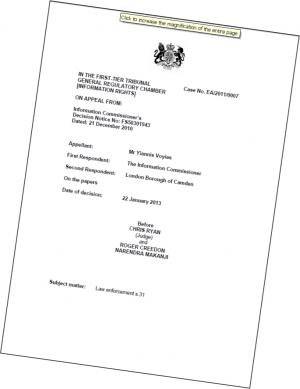
Find more posts
Camden FOI case - door finally closing on release of empty property lists
Latest
February 25, 2013



An Information Tribunal seems to have brought to a close the long-drawn out controversy around Freedom of Infomation requests for lists of empty homes. The Tribunal's conclusion, in its re-hearing of the appeal of Voyjas against the original decision by the Information Commissioner that Camden Council was justified in withholding information about empty homes that were not owned by individuals, was emphatically in favour of the Information Commissioner. and the Council The Tribunal concluded:
The relatively small weight that the public interest in disclosure bears does not, in our view, come close to equalling the public interest in preventing the categories of crime we have identified in this decision. Accordingly the public interest in maintaining the exemption outweighs the public interest in disclosure. The Council was therefore entitled to refuse to disclose the information requested by the Appellant.
You can download the full ruling from here.
FOI - the background
The Bexley FOI case long ago established the position that release by councils of lists of empties owned by private individuals would be a breach of Data Protection principles. However the decision in the Bexley case also stipulated that it would be appropriate to release the addresses of homes owned by non-individuals (companies, councils, housing associations etc), where data protection principles were not engaged. In that case the Information Tribunal decided that the public interest in disclosure outweighed what it considered to be the minimal impact of crime.
Subsequently both Tower Hamlets and Camden declined to release lists of such properties principally on the grounds that to do so would lead to increased crime associated with squatting and stripping of empty homes. In both cases the Information Commissioner upheld the council decisions. There was no appeal in the Tower Hamlets case but in the Camden case the Information Tribunal overturned the Information Commissioner decision, arguing that the public interest in disclosure continued to outweigh the concerns about crime.
Readers may recall that at this point Grant Shapps became involved with public comments criticising the Tribunal's decision. The Council appealed to an Upper Tribunal which said that the lower Tribunal had erred by not taking into account various factors and remitted the case to a different lower Tribunal for a re-hearing of the appeal.
Key points
As the extract quoted above demonstrates, the Information Tribunal's decision was in emphatic disagreement with that of the first Tribunal. Its reasons largely reflected those of the Upper Tribunal. Regarding squatting, which it was generally acknowledged would be likely to involve some criminal damage, it was appropriate to take into account a whole series of impacts beyond the minor amount of criminal damage itself - for example costsof eviction, fear of crime amongst neighbours, costs of enhanced security measures that councils might have to undertake and so on.
On the other side of the equation, it was identified that there were other sources of information about the council's management of its stock and it was held that Voyjas, the appellant, had not made any substantial case as to why a list of empty properties would be better than that information in holding the council to account for its handling of its voids.
It would seem unlikel that Voyjas could successfully appeal against this decision.
Squatting itself not a factor
Although squatting of residential properties is now a crime in its own right, the appeal was heard on the basis of the law at the time the decision was made, when squatting was not a crime. Thus the Appeal Tribunal did not treat squatting itself as a criminal activity though it did satisfy itself that the release of lists of empty homes would tend to increase the amount of squatting (Voyjas gave somewhat contradictory evidence on this score, the Tribunal concluded).
Given how strongly the Tribunal weighed the balance in favour of non-disclosure, it would seem very unlikely that any future Tribunal would take a different view now that squatting of dwellings has been criminalised, thereby adding yet more weight to the argument that releasing the information woiuld prejudice the prevention of crime.
Practical implications
The practical implication would seem to be that councils should no longer release lists of empty homes.unless they are confident that there could be no increase in squatting or stripping of empty homes as a result.
On the other hand, it is important for empty homes practitoners to be aware that this does not prevent information being shared with partners - such as housing associations or community groups - involved in delivering empty homes strategies, providing the information is relased in a controlled way for specific purposes and kept secure from third parties. This would be no different from say Capita processing personal information collected by the Council as part of the out-sourcing of a housing benefits service.
